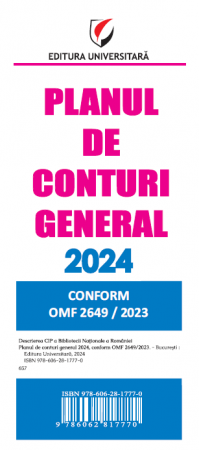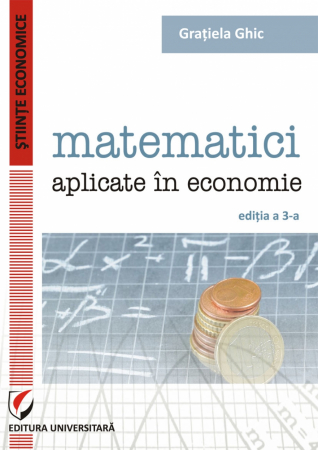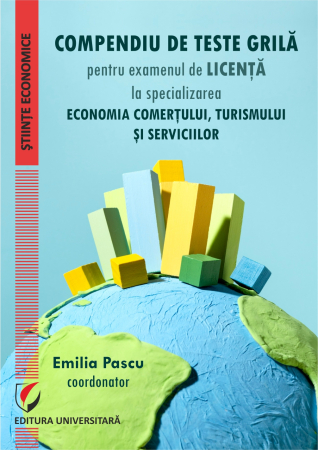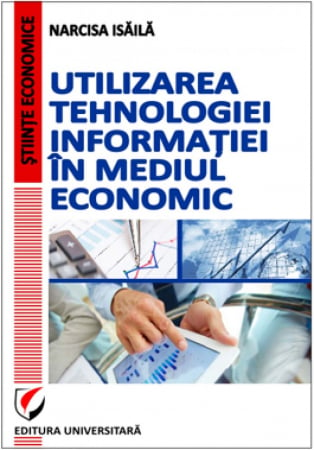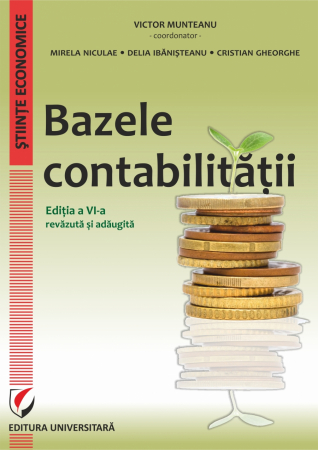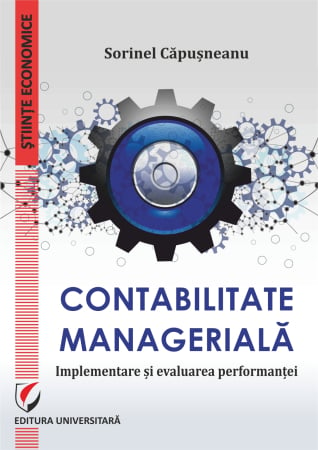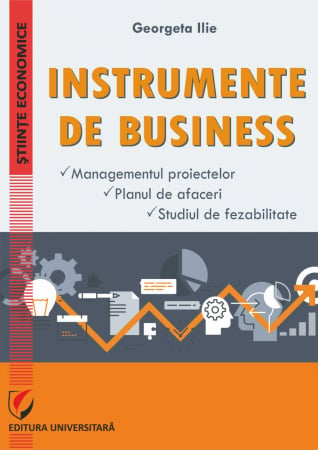Manuscript proposals: [email protected] / 0745 204 115 //// Tracking orders Individuals / Sales: 0745 200 357 / Orders Legal entities: 0721 722 783
Publisher: Editura Universitară
Author: Isa Tak
ISBN: 978-606-28-0126-7
DOI: 10.5682/9786062801267
Publisher year: 2014
Edition: I
Pages: 180
Product Code:
9786062801267
Do you need help?
0745 200 357
- Description
- Download (1)
- Authors
- Content
- More details
- Reviews (0)
The subject of the present research is represented by the non-conforming image of the erroneous financial statements, which include distortions from the true image and thus negatively influence the users of accounting information. The paper pays attention first of all to the concepts of error and fraud encountered in the exercise of the financial audit and on the existing regulations at international, European and national level.
The title of the paper "The impact of erroneous financial information on economic decisions" was chosen to more accurately reflect the perspective from which the chosen topic is approached. First of all, the users of the financial statements are more and more often confronted with the situation of receiving incorrect information, an action resulting in the current context almost entirely and due to the global economic crisis of unusual dimensions. Secondly, we underlined the fact that the financial audit becomes a significant, current and prospective means, able to offer to those interested qualified and neutral assurances regarding the financial statements, thus representing, through the financial auditor, an indispensable link in the credibility of accounting information. included in the financial statements. Thirdly, information, especially that of a financial and accounting nature, is the indispensable element of progress, regardless of the field of activity. Making the right economic decisions that can help solve the complex problems that arise in the life of each entity is influenced by the quality of financial and accounting information and the special role of the financial auditor, especially in the current context, characterized by a wide economic recession. in which errors are very common in financial statements and sometimes in unfortunate cases and large-scale fraud.
The title of the paper "The impact of erroneous financial information on economic decisions" was chosen to more accurately reflect the perspective from which the chosen topic is approached. First of all, the users of the financial statements are more and more often confronted with the situation of receiving incorrect information, an action resulting in the current context almost entirely and due to the global economic crisis of unusual dimensions. Secondly, we underlined the fact that the financial audit becomes a significant, current and prospective means, able to offer to those interested qualified and neutral assurances regarding the financial statements, thus representing, through the financial auditor, an indispensable link in the credibility of accounting information. included in the financial statements. Thirdly, information, especially that of a financial and accounting nature, is the indispensable element of progress, regardless of the field of activity. Making the right economic decisions that can help solve the complex problems that arise in the life of each entity is influenced by the quality of financial and accounting information and the special role of the financial auditor, especially in the current context, characterized by a wide economic recession. in which errors are very common in financial statements and sometimes in unfortunate cases and large-scale fraud.
-
IMPACTUL INFORMATIILOR FINANCIARE ERONATE ASUPRA DECIZIILOR ECONOMICE
Download
ISA TAK
Argument / 11
INTRODUCTION / 13
CHAPTER I. TYPOLOGY OF ERROR FINANCIAL INFORMATION / 15
1.1 Fraud and error in handling financial information / 15
1.1.1 Error or fraud; conceptual delimitations / 15
1.1.2 Handling / 21
1.1.3 Significant damages resulting from errors and fraud / 23
1.1.4 Anti - Fraud Department / 28
1.2 Causes of errors in financial statements / 32
1.3 Types of errors in the presentation of financial statements / 34
1.4 The effects of errors and frauds in the economy / 38
CHAPTER II. INSTRUMENTS AND CAUSES UNDER THE USE OF FRAUD SITUATIONS / 44
2.1 Creative accounting / 44
2.2 Aggressive accounting / 48
2.3 Accounting practice (big bath) / 50
2.4 Fraudulent financial reporting / 51
2.5 Revenue management / 53
2.6 Indices revealing accounting fraud / 55
2.6.1 Non - existent internal control or a non - functional internal control / 59
2.6.2 Abnormal aspects in accounting / 60
2.6.3 Unusual attitudes and transactions / 61
2.6.4 Anomalies regarding the analytical accounts / 61
2.6.5 Irregularity in carrying out activities / 61
2.6.6 Anomalies regarding the management quality characteristics / 62
CHAPTER III. OBJECTIVES AND TECHNIQUES OF HANDLING FINANCIAL INFORMATION / 64
3.1 Objectives of financial information manipulation / 64
3.1.1 Capital market and factors influencing stock prices / 66
3.1.2 Fulfillment of the conditions of the credit agreement (compliance with debt covenants clauses) / 67
3.1.3 Salaries and management bonuses / 69
3.1.4 Diminishing certain costs for political or organizational reasons (to minimize certain political costs) / 70
3.1.5 Increasing the amount of funds attracted by the public call for saving or capital increase / 73
3.1.6 Liquidations and mergers - the impact of manipulation on the value of enterprises (management buy-out) / 76
3.1.7 Decreasing the amount of payment taxes / 77
3.1.8 Ensuring the future reflection of a better performance of the company / 78
3.1.9 Smooting and managing towards a long-term trend / 79
CHAPTER IV. TECHNIQUES FOR HANDLING FINANCIAL INFORMATION / 80
4.1 Revenue accounting in the context of financial information manipulation techniques / 83
4.1.1 Revenue accounting before their realization / 83
4.1.2 Recognition of incomes related to the goods handed over in consignment regime / 84
4.1.3 Accounting for software revenues / 84
4.1.4 Manipulation of the percentage of works advancement / 85
4.1.5 Registration of fictitious income / 86
4.2 Manipulation techniques in accounting for expenses and provisions / 86
4.2.1 Unjustified capitalization of expenses / 87
4.2.2 Manipulation of duration and depreciation method. Depreciation of goodwill / 87
4.2.3 Storing earnings for future years by reporting higher provisions (Storing earnings for future years) / 88
4.2.4 Purchased in-process research and development accounting / 89
4.2.5 Special charges / 91
4.2.6 Manipulations in the presentation of the elements that compose the Financial statements / 91
4.2.7 Modification of the classification of the elements of the global result / 92
4.2.8 Changing the classification of items in the cash flow statement / 93
4.3 Misreported assets and liabilities / 94
4.3.1 Recognition and measurement of impairment losses / 105
4.3.2 Carrying out transactions for the purpose of deliberate recognition of Revenues / 110
4.3.3 Operations for concealing the practices of handling financial statements / 111
4.4 Benefits and advantages of correct presentation in the Financial statements / 113
4.4.1 Investor benefits / 113
4.4.2 Benefits for company and state / 115
4.4.3 The importance of correct financial information, within the organization and the business environment, for making efficient economic decisions / 117
4.4.4 Benefits for the country's economy / 118
CHAPTER V. CONSEQUENCES OF FRAUD ON THE PRESENTATION OF FINANCIAL STATEMENTS / 121
5.1 Fraud in the presentation of financial statements / 121
5.1.1 Fraud of financial statements and responsibility of the financial auditor / 121
5.1.1.1 Assessing the risks of material misstatement in accordance with ISA 240/123
5.1.1.2 Asymmetry between fraud and error / 123
5.1.1.3 Fraud and error - the main importance of misstatements of the financial statements / 125
5.1.2 The importance of the significance threshold to minimize the risk of fraud and error in the financial statements / 127
5.1.3 Common financial fraud schemes / 130
5.1.4 Analysis of the variations of the forecasted budgets with those made by a reflection on the detection of errors and frauds / 132
5.2 Causes of financial information manipulation / 134
5.2.1 Inefficient management of companies / 135
5.2.2 Hiding acts of corruption / 135
5.2.3 Interests of managers / 135
5.2.4 Tax evasion / 136
5.2.5 Presentation of a true and fair view of the financial statements / 136
5.3 Identification of financial reports and accompanying information / 137
5.3.1 Identification of financial statements / 137
5.3.2 Declarations of compliance with IFRS / 138
5.4 Objectives of presenting the financial statements / 138
5.5 Limits of the information contained in the financial statements / 141
5.6 Significant events that influence the presentation of the Financial Statements / 142
5.6.1 Significant events that influence the presentation of financial statements on international markets / 143
5.6.2 Significant events influencing the presentation of financial statements in Turkey / 147
CHAPTER VI. OPINIONS AND PROPOSALS FOR COMBATING THE PHENOMENON / 149
6.1 Financial information and their importance at national and international level / 149
6.2 Impact of erroneous financial information and control methods / 151
6.3 Objectives and techniques of manipulation of financial information / 156
6.4 Consequences of fraud on the presentation of financial statements / 161
BIBLIOGRAPHY / 173
LIST OF ABBREVIATIONS / 180
INTRODUCTION / 13
CHAPTER I. TYPOLOGY OF ERROR FINANCIAL INFORMATION / 15
1.1 Fraud and error in handling financial information / 15
1.1.1 Error or fraud; conceptual delimitations / 15
1.1.2 Handling / 21
1.1.3 Significant damages resulting from errors and fraud / 23
1.1.4 Anti - Fraud Department / 28
1.2 Causes of errors in financial statements / 32
1.3 Types of errors in the presentation of financial statements / 34
1.4 The effects of errors and frauds in the economy / 38
CHAPTER II. INSTRUMENTS AND CAUSES UNDER THE USE OF FRAUD SITUATIONS / 44
2.1 Creative accounting / 44
2.2 Aggressive accounting / 48
2.3 Accounting practice (big bath) / 50
2.4 Fraudulent financial reporting / 51
2.5 Revenue management / 53
2.6 Indices revealing accounting fraud / 55
2.6.1 Non - existent internal control or a non - functional internal control / 59
2.6.2 Abnormal aspects in accounting / 60
2.6.3 Unusual attitudes and transactions / 61
2.6.4 Anomalies regarding the analytical accounts / 61
2.6.5 Irregularity in carrying out activities / 61
2.6.6 Anomalies regarding the management quality characteristics / 62
CHAPTER III. OBJECTIVES AND TECHNIQUES OF HANDLING FINANCIAL INFORMATION / 64
3.1 Objectives of financial information manipulation / 64
3.1.1 Capital market and factors influencing stock prices / 66
3.1.2 Fulfillment of the conditions of the credit agreement (compliance with debt covenants clauses) / 67
3.1.3 Salaries and management bonuses / 69
3.1.4 Diminishing certain costs for political or organizational reasons (to minimize certain political costs) / 70
3.1.5 Increasing the amount of funds attracted by the public call for saving or capital increase / 73
3.1.6 Liquidations and mergers - the impact of manipulation on the value of enterprises (management buy-out) / 76
3.1.7 Decreasing the amount of payment taxes / 77
3.1.8 Ensuring the future reflection of a better performance of the company / 78
3.1.9 Smooting and managing towards a long-term trend / 79
CHAPTER IV. TECHNIQUES FOR HANDLING FINANCIAL INFORMATION / 80
4.1 Revenue accounting in the context of financial information manipulation techniques / 83
4.1.1 Revenue accounting before their realization / 83
4.1.2 Recognition of incomes related to the goods handed over in consignment regime / 84
4.1.3 Accounting for software revenues / 84
4.1.4 Manipulation of the percentage of works advancement / 85
4.1.5 Registration of fictitious income / 86
4.2 Manipulation techniques in accounting for expenses and provisions / 86
4.2.1 Unjustified capitalization of expenses / 87
4.2.2 Manipulation of duration and depreciation method. Depreciation of goodwill / 87
4.2.3 Storing earnings for future years by reporting higher provisions (Storing earnings for future years) / 88
4.2.4 Purchased in-process research and development accounting / 89
4.2.5 Special charges / 91
4.2.6 Manipulations in the presentation of the elements that compose the Financial statements / 91
4.2.7 Modification of the classification of the elements of the global result / 92
4.2.8 Changing the classification of items in the cash flow statement / 93
4.3 Misreported assets and liabilities / 94
4.3.1 Recognition and measurement of impairment losses / 105
4.3.2 Carrying out transactions for the purpose of deliberate recognition of Revenues / 110
4.3.3 Operations for concealing the practices of handling financial statements / 111
4.4 Benefits and advantages of correct presentation in the Financial statements / 113
4.4.1 Investor benefits / 113
4.4.2 Benefits for company and state / 115
4.4.3 The importance of correct financial information, within the organization and the business environment, for making efficient economic decisions / 117
4.4.4 Benefits for the country's economy / 118
CHAPTER V. CONSEQUENCES OF FRAUD ON THE PRESENTATION OF FINANCIAL STATEMENTS / 121
5.1 Fraud in the presentation of financial statements / 121
5.1.1 Fraud of financial statements and responsibility of the financial auditor / 121
5.1.1.1 Assessing the risks of material misstatement in accordance with ISA 240/123
5.1.1.2 Asymmetry between fraud and error / 123
5.1.1.3 Fraud and error - the main importance of misstatements of the financial statements / 125
5.1.2 The importance of the significance threshold to minimize the risk of fraud and error in the financial statements / 127
5.1.3 Common financial fraud schemes / 130
5.1.4 Analysis of the variations of the forecasted budgets with those made by a reflection on the detection of errors and frauds / 132
5.2 Causes of financial information manipulation / 134
5.2.1 Inefficient management of companies / 135
5.2.2 Hiding acts of corruption / 135
5.2.3 Interests of managers / 135
5.2.4 Tax evasion / 136
5.2.5 Presentation of a true and fair view of the financial statements / 136
5.3 Identification of financial reports and accompanying information / 137
5.3.1 Identification of financial statements / 137
5.3.2 Declarations of compliance with IFRS / 138
5.4 Objectives of presenting the financial statements / 138
5.5 Limits of the information contained in the financial statements / 141
5.6 Significant events that influence the presentation of the Financial Statements / 142
5.6.1 Significant events that influence the presentation of financial statements on international markets / 143
5.6.2 Significant events influencing the presentation of financial statements in Turkey / 147
CHAPTER VI. OPINIONS AND PROPOSALS FOR COMBATING THE PHENOMENON / 149
6.1 Financial information and their importance at national and international level / 149
6.2 Impact of erroneous financial information and control methods / 151
6.3 Objectives and techniques of manipulation of financial information / 156
6.4 Consequences of fraud on the presentation of financial statements / 161
BIBLIOGRAPHY / 173
LIST OF ABBREVIATIONS / 180
The subject of the present research is represented by the non-conforming image of the erroneous financial statements, which include distortions from the true image and thus negatively influence the users of accounting information. The paper pays attention first of all to the concepts of error and fraud encountered in the exercise of the financial audit and on the existing regulations at international, European and national level.
The title of the paper "The impact of erroneous financial information on economic decisions" was chosen to more accurately reflect the perspective from which the chosen topic is approached. First of all, the users of the financial statements are more and more often confronted with the situation of receiving incorrect information, an action resulting in the current context almost entirely and due to the global economic crisis of unusual dimensions. Secondly, we underlined the fact that the financial audit becomes a significant, current and prospective means, able to offer to those interested qualified and neutral assurances regarding the financial statements, thus representing, through the financial auditor, an indispensable link in the credibility of accounting information. included in the financial statements. Thirdly, information, especially that of a financial and accounting nature, is the indispensable element of progress, regardless of the field of activity. Making the right economic decisions that can help solve the complex problems that arise in the life of each entity is influenced by the quality of financial and accounting information and the special role of the financial auditor, especially in the current context, characterized by a wide economic recession. in which errors are very common in financial statements and sometimes in unfortunate cases and large-scale fraud.
One aspect that we want to clarify since the introduction of this research is that the distinguishing factor between fraud and error is given by the fundamental action that results in the distortion of financial statements, namely whether this action is intentional or unintentional.
In this paper we have considered the methods of manipulation of financial knowledge, such as "fictitious financial statements", "creative accounting", "aggressive accounting" and "accounting irregularities", which have negative effects on the real economy. . Sometimes, for certain personal or corporate reasons, published information about companies may be changed without supporting documents and a relevant and professional analysis. The Markets Board in some situations describes the financial manipulation of knowledge as offering erroneous and untrue information or making wrong comments, which may affect the value of capital market instruments or not report the correct information.
In recent years, important issues such as "fraudulent financial reports" and "manipulated financial information" have been raised by financial institutions, the financial community, the press, investors and governments. The negative effects of fraudulent financial information continue to be a serious problem affecting organizations around the world, despite the actions taken by regulators. This is even more true today, in an environment where the economic crisis has led to a significant increase in pressure on organizations and individuals to perform, creating more fraud incentives and generating more opportunities for error and fraud.
This paper considers aspects such as erroneous and fraudulent information in the financial statements as well as the financial audit which is the cornerstone in the credibility of accounting information.
The degree of novelty of the approached topic is an extremely current one, first of all due to the interest granted by the international as well as national bodies (Romanian Chamber of Financial Auditors and the Body of Expert Accountants and Certified Accountants from Romania). Although the subject has received special attention both nationally and internationally, we believe that the most important aspect we addressed in the research is the main methods and techniques used by management or employees, as appropriate, in trying to induce in error not only the users of the accounting information, but also of the financial auditor.
The title of the paper "The impact of erroneous financial information on economic decisions" was chosen to more accurately reflect the perspective from which the chosen topic is approached. First of all, the users of the financial statements are more and more often confronted with the situation of receiving incorrect information, an action resulting in the current context almost entirely and due to the global economic crisis of unusual dimensions. Secondly, we underlined the fact that the financial audit becomes a significant, current and prospective means, able to offer to those interested qualified and neutral assurances regarding the financial statements, thus representing, through the financial auditor, an indispensable link in the credibility of accounting information. included in the financial statements. Thirdly, information, especially that of a financial and accounting nature, is the indispensable element of progress, regardless of the field of activity. Making the right economic decisions that can help solve the complex problems that arise in the life of each entity is influenced by the quality of financial and accounting information and the special role of the financial auditor, especially in the current context, characterized by a wide economic recession. in which errors are very common in financial statements and sometimes in unfortunate cases and large-scale fraud.
One aspect that we want to clarify since the introduction of this research is that the distinguishing factor between fraud and error is given by the fundamental action that results in the distortion of financial statements, namely whether this action is intentional or unintentional.
In this paper we have considered the methods of manipulation of financial knowledge, such as "fictitious financial statements", "creative accounting", "aggressive accounting" and "accounting irregularities", which have negative effects on the real economy. . Sometimes, for certain personal or corporate reasons, published information about companies may be changed without supporting documents and a relevant and professional analysis. The Markets Board in some situations describes the financial manipulation of knowledge as offering erroneous and untrue information or making wrong comments, which may affect the value of capital market instruments or not report the correct information.
In recent years, important issues such as "fraudulent financial reports" and "manipulated financial information" have been raised by financial institutions, the financial community, the press, investors and governments. The negative effects of fraudulent financial information continue to be a serious problem affecting organizations around the world, despite the actions taken by regulators. This is even more true today, in an environment where the economic crisis has led to a significant increase in pressure on organizations and individuals to perform, creating more fraud incentives and generating more opportunities for error and fraud.
This paper considers aspects such as erroneous and fraudulent information in the financial statements as well as the financial audit which is the cornerstone in the credibility of accounting information.
The degree of novelty of the approached topic is an extremely current one, first of all due to the interest granted by the international as well as national bodies (Romanian Chamber of Financial Auditors and the Body of Expert Accountants and Certified Accountants from Romania). Although the subject has received special attention both nationally and internationally, we believe that the most important aspect we addressed in the research is the main methods and techniques used by management or employees, as appropriate, in trying to induce in error not only the users of the accounting information, but also of the financial auditor.
If you want to express your opinion about this product you can add a review.
write a review

6359.png)
![Erroneous impact of financial information on the economic decisions [1] Erroneous impact of financial information on the economic decisions [1]](https://gomagcdn.ro/domains/editurauniversitara.ro/files/product/large/impactul-informatiilor-financiare-eronate-asupra-deciziilor-economice-883-247290.jpg)
